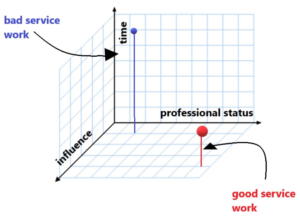Inclusion with influence
Inclusion with influence is necessary if our equity policies are to be genuinely empowering for members of underrepresented groups (Bunjun 2011, 270 ff.). Colleagues and administrators should support members of underrepresented groups by ensuring they are not disproportionately burdened with service work that is time consuming, has little influence on their disciplines, departments and universities, and is of low professional status. Much of this service work that is not recognised by departments is essential to the profession, our universities, and our departments. This means that senior scholars and members of overrepresented groups must, concomitantly, be willing to serve in these roles.
Judgements of professional status can be made on the basis of the relevance of said service work for tenure, promotion, and professional honors. To determine influence, look to whether the position is a gatekeeper for students, scholars, or scholarship and whether the position offers opportunities to shape academic and disciplinary institutions. The contrast should be made with the professional status and influence that would accrue to the scholar should they have the equivalent time to pursue their research. Attention should be paid to work in the service of teaching versus service work in the service of research as typically service work addressing research is deemed higher status than that concerned with teaching, though university cultures vary on this point.

